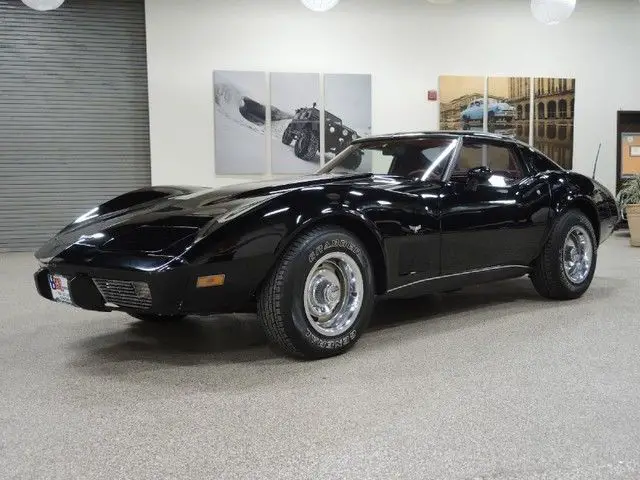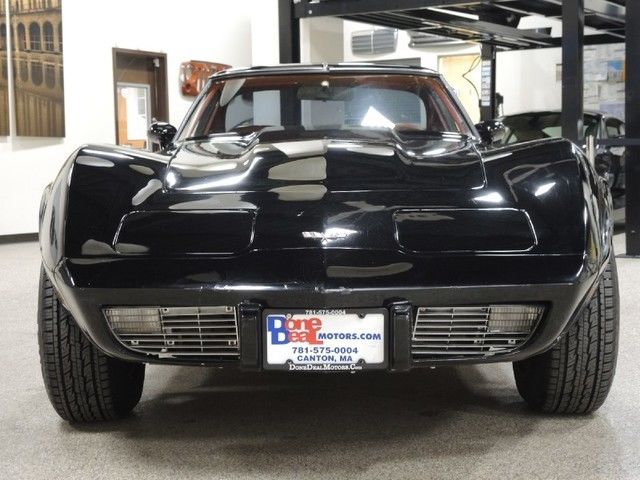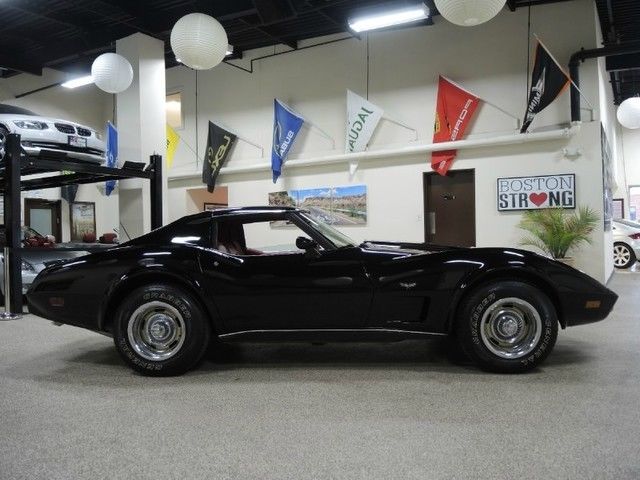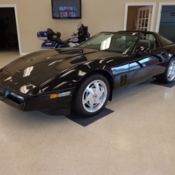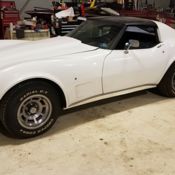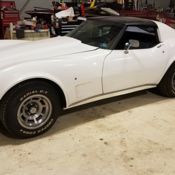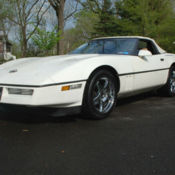1977 Chevrolet Corvette with 53,000 Miles Automatic Trans NO RESERVE Nice Car
| Condition: | Used |
| Make: | Chevrolet |
| Model: | Corvette |
| Type: | Coupe |
| Doors: | 2 |
| Year: | 1977 |
| Mileage: | 53,333 |
| VIN: | 1Z37L7S408457 |
| Color: | Black |
| Engine: | 8 |
| Fuel: | Gas |
| Transmission: | Automatic |
| Drivetrain: | Front Wheel Drive |
| Interior color: | Red |
| Vehicle Title: | Clear |
| Item location: | Canton, Massachusetts, United States |
| Extras |
| Listed by | Private seller |
Description of 1977 Chevrolet Corvette |
|
1977 Chevrolet CORVETTE 1977 Chevrolet Corvette with 53,000 All Original miles, it is in excellent running condition, runs and drives great, it needs some minor cosmetic T.L.C, no visible rust anywhere. Drives very strong, please looks at all the pictures to get better idea. We are selling this vehicle at NO RESERVE AUCTION!!! The 1975 model was advertised as "a more efficient Corvette,"as service intervals were extended and electronic ignition and the federally mandated catalytic converter were introduced with "unleaded fuel only" warnings on the fuel gauge and filler door. Dual exhaust pipes were routed to a single converter, then split again leading to dual mufflers and tailpipes. Starting this year, tachometers were electronically driven. The Corvette began to be influenced by the metric system as speedometers now displayed small subfaces indicating kilometers-per-hour. 75's featured revised inner bumper systems with molded front and rear simulated bumper guards. The urethane rear bumper, now in its second year, reappeared as a one-piece seamless unit. This was the final year for Astro Ventilation. Power bottomed out this year — the base engine produced only 165hp (123kW) and the only remaining optional motor, the L-82, dropped an astonishing 45hp (34kW), managing to deliver 205hp (153kW). With no larger engine available, L-82 hood emblems began to appear on cars so equipped. Unchanged was the standard rear axle ratio for the base engine, which remained at 3.08 with automatic and 3.36 with manual transmission. This was the last convertible for the 1968-82 third-generation and only 12% of the cars were ordered as such. As in previous years, a folding top came standard with roadsters and a body color or vinyl covered hardtop was optional at additional cost.Anticipating further federal safety restrictions, Chevrolet believed it would be Corvette's last soft-top model ever but the convertible returned in 1986. Due to the state’s strict emissions standards, this was the last year Chevrolet installed the L-82 engine in a Corvette destined for California. Car and Driver recorded a respectable 7.7second 0-60 time in a 1975 base engine-automatic, making the Corvette still one of the fastest cars available at the time. C&D said: "The Corvette feels highly competent with power-everything to help you guide the long body around..." 1976 models featured steel floor panels shielding the catalytic converter exhaust. These steel floor panels weighed less than the previous fiberglass floor and reduced interior noise levels. Horsepower rose to 180hp (134kW) for the base L-48 engine; 210hp (157kW) for the optional L-82. To further reduce cabin noise levels, cowl induction was dropped in favor of the air cleaner ducted over the radiator, picking up outside air from the front of the car, thus reducing wind turbulence at the base of the windshield. The hood was carried over, with its cowl vent grille and induction system opening becoming non-functional. The optional cast aluminum wheels were finally made available, which reduced the unsprung weight of the car by 32pounds. Nearly 15% of the cars were ordered with the new wheels at a cost of $299. A standard steel rim spare was used. This was the last year for optional white striped tires, as 86% of the cars were being delivered with the optional white lettered tires.A new rear nameplate for the rear bumper cover was introduced, eliminating the individual "Corvette" letters used since 1968. An unwelcome change was the "Vega GT" 4-spoke steering wheel, although its smaller diameter did provide extra room and eased entry/exit. The steering wheel, color-keyed to the interior, continued on 1977 through 1979 models, limited to non-tilt wheel cars only. GM's "Freedom" battery, a new sealed and maintenance-free unit, was now installed in all cars.The rear window defroster option was changed from the forced-air type of previous years to the new "Electro-Clear" defogger, an in-glass heated element type.Even without a convertible model, the Corvette still set new sales records. Car and Driver recorded 6.8second 0-60 times in both L-48 and L-82 4-speed equipped 1976 Corvettes. The magazine ordered an L-48 4-speed for a 4,000-mile (6,400km) road trip to Alaska. C&D summarized: "The Corvette was a big hit–we expected and thoroughly enjoyed that–but we were surprised at how well it withstood the ordeal...once we recovered from the trip we conceded that we'd developed new respect for a car we'd long regarded as something of a put on. In every sense of the word, our Yukon Corvette proved to be tough and we'd have to say that even the production versions impressed us as coming closer to being real touring cars than we might ever have thought. There's a lot more sincere ring now to our stock answer to the question, Why a Corvette?" 1977 saw the steering column repositioned 2 inches (51mm) closer to the dashboard to allow a more "arms out" position for the driver. The custom interior with leather seat trim was now standard, with cloth and leather a no-cost option. A redesigned center console permitted universal Delco radio options. One consequence of this modification was that an 8-track tape player was now available as an option. Auxiliary gauges were restyled and theammeter was replaced with a voltmeter.The sun visors were redesigned to swivel so as to provide some glare protection from the side as well as the front. Chevrolet responded to the criticism of the previous year’s steering wheel with an all new three-spoke leather-wrapped unit, which was well received. Chevrolet featured this new wheel prominently on the front of their new Corvette sales brochure. The new wheel came on all cars fitted with the optional tilt-telescopic steering column which was ordered on all but a few thousand Corvettes.Corvette's refinement as a touring sports car continued as both power steering and power brakes became standard and new options included body-colored sport mirrors, cruise control, and a new convenience group. Cruise control was only available on cars with automatic transmissions. The convenience group included dome light delay, headlight warning buzzer, underhood light, low fuel warning light, interior courtesy lights, and passenger side visor mirror. The black exterior paint color returned (last offered in 1969).Unchanged was the horsepower ratings for both base and L-82 engines. Early in production, the engine paint color was changed from Chevy orange to Corporate blue. The “Stingray” script, seen on front fenders since 1969 disappeared, but new cross-flags emblems began appearing on fenders before the model year ended. Windshield posts were now painted black for a “thin pillar” look and this was the final year of the "sugar scoop" tunneled roof-line and vertical back window.A Corvette milestone was reached during 1977 as Chevrolet had built a half million Corvettes since production began in 1953. If there is something you would like installed in your new vehicle just ask us; it would be our pleasure to accommodate you.
|
 Home
Home Contact us
Contact us NEWEST CARS
NEWEST CARS SELL YOUR CAR
SELL YOUR CAR FAQ
FAQ